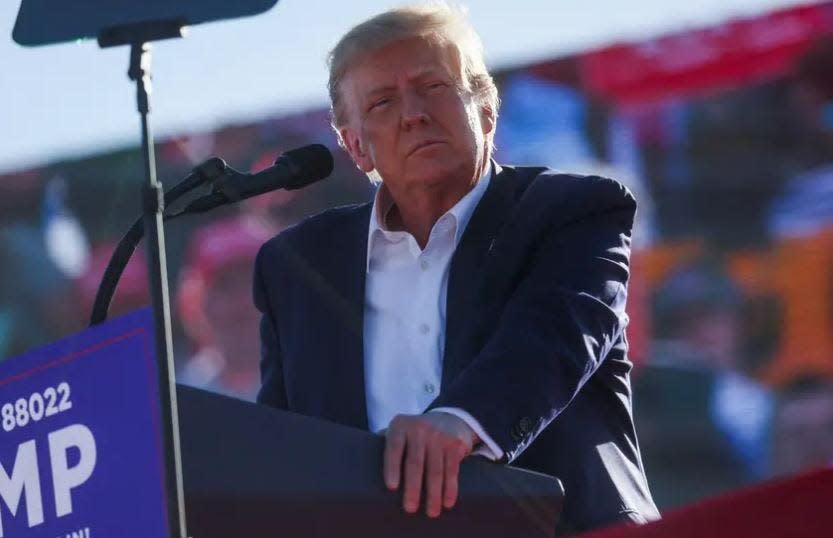Now that Donald Trump is indicted, can he still run for president?
- Oops!Something went wrong.Please try again later.
- Oops!Something went wrong.Please try again later.
This Q&A was written by Kevin Wagner, a noted constitutional scholar and political science professor at Florida Atlantic University in Boca Raton. The answers provided do not necessarily represent the views of the university. He writes a weekly column on constitutional issues for The Palm Beach Post.
Q: Can a person run for office if they’ve been indicted or convicted of a crime?
A: Since the U.S. has a federal system, the rules establishing the qualifications for office can vary by which office you are trying for, and by the state, county, or municipality in which you live. For example, Florida, which had barred felons, now allows individuals who have completed their sentences to run for office or serve on juries once they have their civil rights restored. In other states, the rules may be less strict, or may depend on the severity of the crime and the length of time since the conviction.
While states can establish qualifications for their offices, the requirements for election to federal office are set in the U.S. Constitution. For example, Article II describes the requirements to serve as President, such as being a natural-born citizen, at least 35 years of age, and having been a resident of the country for at least 14 years. There is no explicit prohibition on individuals with criminal records running for president, and the Constitution does not prohibit anyone based on indictments or convictions.
HISTORIC: Grand jury indicts Donald Trump in New York, first time a former president is charged criminally
FRANK CERABINO: Dear Mar-a-Lago Club members: My indictment is going to cost you
More: Florida Republicans outraged by reports grand jury has voted to indict Trump
In 1920, Eugene Debs ran for President as a Socialist while he was serving time in prison for speaking out against the draft during World War I. Debs was convicted of violating the Sedition Act of 1918. After charging Debs, the federal prosecutor said, “No man even though four times the candidate of his party for the highest office in the land, can violate the basic law of this land.” Debs won nearly one million votes while he was in prison but did not win a single Electoral College vote.

The Constitution does not bar felons from Congress either, and the U.S. Supreme Court, in U.S. Term Limits v. Thornton (1995), ruled that states cannot add additional qualifications for congressional candidates. However, the House of Representatives has a rule that members convicted of a felony be removed from committee activities unless and until they are re-elected. Both the Senate and the House can censure and even expel members.
Trump indictment: Can he still run for president?
The Constitution does have one additional restriction. Under Section 3 of the 14th Amendment, anyone who has engaged in insurrection or rebellion against the United States is prohibited from holding federal office. Interestingly, there is no requirement that a person be convicted for this to apply, and it was used to remove individuals linked to the Confederacy during the Civil War.
Trump indicted: Has any other former U.S. president been indicted? No, but these guys came close.
Congress has refused to seat some members using this provision. In 1919, Congress cited the 14th Amendment to block Victor Berger, who was accused of supporting Germany during World War I. Berger was eventually allowed to serve after his espionage conviction was reversed by the U.S. Supreme Court.
Recently, we have seen efforts to bar candidates from running for Congress based on their involvement with the violence at the Capitol on Jan. 6, 2021. As of yet, no candidates have been disqualified for federal office based on this, and there is significant disagreement over the meaning and application of this prohibition in the modern context. Ultimately, the most significant limitation on access to elected office is still the voters, who can weigh the importance of a conviction or other actions and decide for themselves who will be their representative.

If you have a question about how American government and politics work, email Kevin Wagner at kwagne15@fau.edu or reach him on Twitter @kevinwagnerphd. You can read past columns here: https://www.palmbeachpost.com/search/?q=kevin+wagner .
This article originally appeared on Palm Beach Post: Trump indictment: Can people who've been charged run for office?

